| Irish Forums Message Discussion :: RIC Police Ireland's Vichy law, Milice & other Collaborators |
   | Irish Forums :: The Irish Message
Forums About Ireland and the Irish Community, For the Irish home and Abroad. Forums include- Irish Music, Irish History, The Irish Diaspora, Irish Culture, Irish Sports, Astrology, Mystic, Irish Ancestry, Genealogy, Irish Travel, Irish Reunited and Craic
|  
|
RIC Police Ireland's Vichy law, Milice & other Collaborators


|
|
|
| Irish
Author |
RIC Police Ireland's Vichy law, Milice & other Collaborators Sceala Irish Craic Forum Irish Message |
|
Frank Devenny
Sceala Philosopher
Location: Mayo. Ireland
|
| Sceala Irish Craic Forum Discussion:
RIC Police Ireland's Vichy law, Milice & other Collabora
|
|
|
The Royal Irish Constabulary (RIC) was a British Crown armed country-wide physical force between 1822 in 1922 and 85,028 men passed through its ranks. The RIC was disbanded on 31 August 1922
No matter a nations history, statements (even brief) of Historical facts are very few and far between, there is always some level for debate to doubt.
If there is one historical fact about the story of Ireland, one that every reasonable and credible historian can agree upon, then it would surely be that Ireland was - made a Crown colony of London by physical force.
The native majority population of Ireland have never invited the foreign monarchy of England to rule or claim them, or did they ever vote for political Interference from the Foreign English Crown Government of Westminster.
By way of trickery or physical threat, or actual violence from forces of a foreign empire, Irish natives were cynically divided by piecemeal and subdued. Ireland became a purposely divided and troubled Colony of a foreign greed driven empire. Any so called "authority in Ireland" prior to the national vote and fight for Independence, was only there by way of constant threat of terror, Colonial Crown terrorism.
Ironically the Vichy French could arguably claim at least claim some credibility compared to any Westminster Colonial Irish body, at least the French Vichy was created out of some original form of general native consensus.
The Milice francaise (French Militia) were part of the Vichy. The Milice were a auxilliary division of the Vichy Police. They were created by the Nazis to help their fight against The French Resistance.
The Malice were a carbon copy of the feared and hated section of the RIC known as the Black and Tans, specifically the Auxiliary Division of the Royal Irish Constabulary (ADRIC), generally known as the Auxiliaries or Auxies.
The then Secretary of State for War, Winston Churchill, suggested the formation of a "Special Emergency Gendarmerie, which would become a branch of the Royal Irish Constabulary.
The Crown created the Auxies to help the RIC fight against Irish Resistance.
The auxies and the RIC worked in tandem to target the IRA, who were a legitimate voice of the Irish people who voted the First Dail. Like the Vichuy and Milice, The RIC and Auxies also targeted civilians, murdered and carried out political assassinations on behalf of a foreign physical power.
One cowardly and evil example being 20 March 1920, Tomas Mac Curtain, a leading Irish independence nationalist and popular Lord Mayor of Cork, was shot dead in front of his wife and son by a group of men with blackened faces, who were found to be members of the Royal Irish Constabulary (RIC) by the official inquest into the event.
Can you tell who is who
One is the Milice of the Vichy, the other is the the Auxiliary Division of the Royal Irish Constabulary (ADRIC).
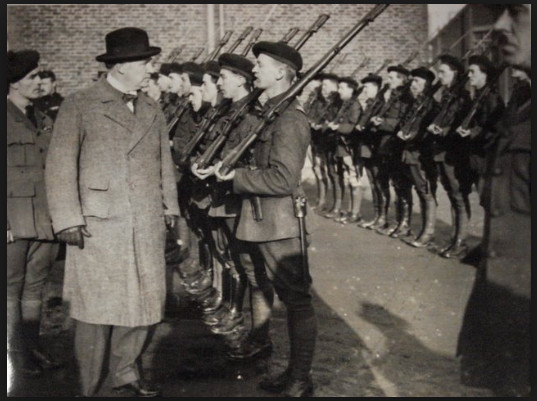 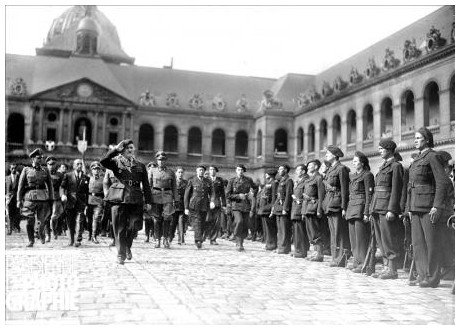
Vichy France was established after France surrendered to Germany on 22 June 1940.
In 1940, the Prime Minister of the Third Republic, Petain set up a paternalistic, semi-fascist regime that actively collaborated with Germany, its official neutrality notwithstanding. This Vichy government cooperated with the Third Reich, even carrying out the Nazi racial policies against their own citizens.
Sound familiar.
The Crown police force in Ireland was known as the RIC. supposed Royal Irish Constabulary.
They were armed with weapons from foundation and their office quarters were not known as barracks by error.
In England for example, the Police or population do not refer to the office of Police operations as a barracks, they are known as Police stations.
In Ireland the RIC operated out of barracks, this is because the RIC were never just ordinary police, they were not created by design to be guardians of the Irish public. The RIC were a Vichy Milice like paramilitary force, not recognizable to any genuine state Police force as we know and generally respect and honor today.
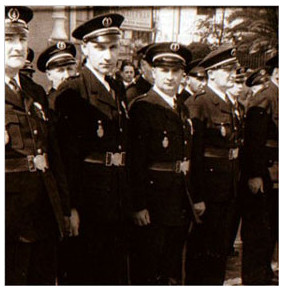 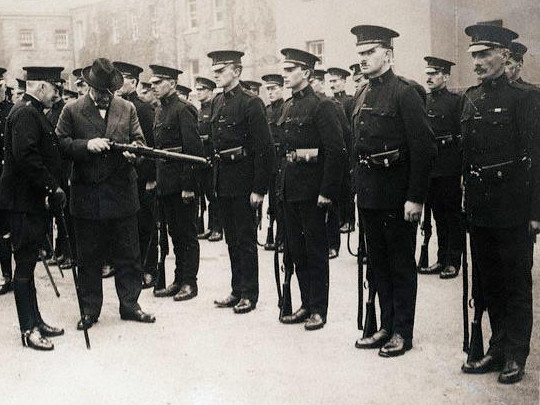
Vichy Puppet Police in France and Ireland
RIC
Some people who had ancestors in the disbanded RIC, may want to glamorize, even romance their ancestors, imagine them all heroes. They may do this to compensate for the reality that their own ancestors were Collaborating with a physical force foreign power. Some people want to present the RIC as a misunderstood, forgotten brave Irish police force.
All that is perfectly understandable, as none of us want to consider our ancestors so cheaply, but such claims remain false.
The RIC were a foreign paramilitary force of the Westminster Crown, imposed on the Irish people. The RIC carried out many crimes on behalf of that foreign crown and Government, including political assassinations and murder.
Of course the story of any group of people is never straight forward, in the ranks of the RIC were many Irish men who sympathetic to Irish political independence, some were indeed very brave double agents working to help free Ireland from foreign dictate. Some others had enough base morals to resign when they realized they were enforcers for British empire, who ruled the world by physical force and terrorism of native populations.
That the individual stories will differ, does not change the central moral premise, that the RIC have nothing in common with An
An Garda Siochana - the first and only police force of the Irish people.
Unlike the foreign crown oath swearing RIC, An Garda Siochana swear a oath to the Irish Constitution and to the People of Ireland.
from the Garda 2005 Act on Irishstatutebook.ie/2005/en/act/pub/0020/sec0016.html#sec16
Quote:
"Solemn declaration.
16.'(1) On being appointed, each member of the Garda Siochana shall make before a Peace Commissioner a declaration in the following form:
'I hereby solemnly and sincerely declare before God that'
' I will faithfully discharge the duties of a member of the Garda Siochana with fairness, integrity, regard for human rights, diligence and impartiality, upholding the Constitution and the laws and according equal respect to all people,
' while I continue to be a member, I will to the best of my skill and knowledge discharge all my duties according to law, and
' I do not belong to, and will not while I remain a member form, belong to or subscribe to, any political party or secret society whatsoever.'.
(2) The words 'before God' may be omitted from the declaration at the request of the declarant."
The Vichy RIC swore a very different oath
Royal Irish Constabulary, swore a oath of allegiance to the British Crown. On enlistment recruits swore an oath of allegiance to the reigning monarch of London and his or her successors.
Therefore to compare the RIC and the Vichy Police is reasoned. Those natives who joined the Royal Irish Constabulary and law enforcement agencies, were of the same generally low quality as those French who became law officers for the German Nazi controlled French Vichy.
However, it is only fair to point out that very few if any, recruits would have joined if they were not being paid. Some people may want to assume a genuine loyalty for collaborators. Often as not the principal motivation for joining up, was paid employment.
The Royal Irish Constabulary in Limerick
by P.J. Ryan
Comments about the RIC, their allegiance to the Westminster Crown, making specific reference to the paramilitary nature of this physical agent of the English Crown.
C he Royal Irish Constabulary held seven barracks in Limerick city. These were located at William Street, by P.J. Ryan John street, Mary Street, Frederick Street, Edward Street, Mulgrave Street (near the Pike), Caherdavin and at Mill Road, Corbally. On the outskirts of the city, about a mile distant, there were more police barracks. These were located at Cratloe Castle on the Ennis Road, at the crossroads at Castletroy on the Dublin Road, at Dooradoyle on the Cork Road, at the end of Barrack Road, Mungret, and at Clarina. From this it can be seen that the city was held and encircled by a mobile police- force, with about 20 men in each barrack. The number of police in the city was over three hundred. In the county and country generally, there was a police barrack within a short distance of every lord's residence.
Recruits to the R.I.C. were selected for their physique. On enlistment recruits swore an oath of allegiance to the reigning monarch and his or her successors. They were then sent to a training department where they were drilled like army recruits in the use of firearms.
They were armed successively with each improved form of rifle supplied to the army. They wore a bottle-green uniform with black but- tons and black leather belt, holding a baton in a leather case and a pouch with handcuffs. When carrying firearms they also wore a black leather bandolier containing cartridges for their rifle. Every year they spent a fortnight on a training course. When leaving the city for this annual event they marched in military formation with rifles on their shoulders. During their absence other men took their places.
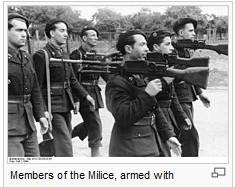
No not the RIC, The Vichy Milice.
Bicycles were the normal mode of transport, but in an emergency the R.I.C. were empowered to seize .any form of transport for their immediate use. In general they were not unpleasant but held themselves aloof and few people wilfully sought their company.
When taking a person under arrest to the nearest barrack they would usually handcuff the prisoner with his hands in front. In court cases a constable would state, 'Acting on information received' etc., without divulging the source of his information. Such a statement was accepted as evidence and could result in the conviction of an accused person.
The constable could not be compelled to divulge the source of his information. On conviction a prisoner sentenced to imprisonment was taken to the County Jail in Mulgrave Street in a totally enclosed four-wheeled, horsedrawn prison van.
Every constable was sent to patrol several streets. This was called his beat. By a blast on his police whistle he could, if needed, summon help from a nearby beat. A citizen could also by a blast on a police whistle summon a constable from his beat. Few citizens availed of this privilege, as penalties were imposed for its abuse, or for possessing a police whistle without lawful need.
Every constable was compelled to possess a civilian suit of clothes to enable him to mix undetected among the civilian population and thereby gain information. Their stature and ear- splitting silence, or their authoritative voice if they spoke, always revealed their identity. They were the eyes and the ears of the British Government in Ireland, seeing all, hearing all and putting all in their daily report to their superior officers. Promotion to the rank of sergeant was by a competitive examination, assisted by zealously filled daily reports. The higher ranks such as district inspector, etc., were the prerequisite of retired colonels and majors of the British Army.
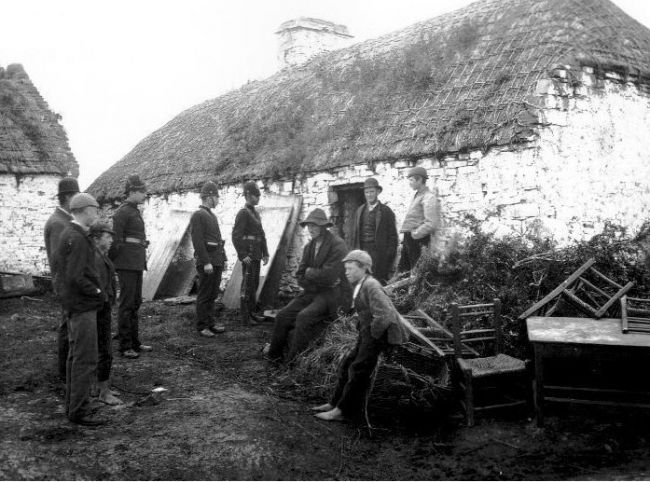
The RIC carried out Crown policy at the point of a gun. they enforced tithes and evictions for the benefit of foreign interests or native collaborator. The RIC were used to put down Irish independence, from the Ribbon men to Fenians to the Irish army of the first Dail Eireann, which represented the overwhelming electoral support in the elections of 1918 and 1920.
The RIC used it paramilitary guns and fixed bayonets against the Irish people, against every native civil or political agitation, against Irish separatism, they did so for the Crown. History shows that the RIC was a collaborator paramilitary force by any fair comparison.
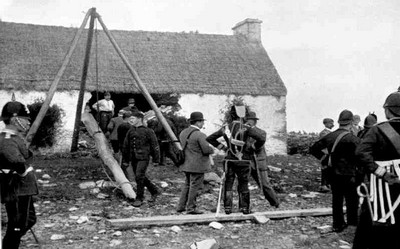
Unfortunately the damaging effects of the RIC were not just felt in Ireland. They were used by the British empire as the template for keeping natives in line. The RIC was instrumental in organizing practically all the 'supposed police forces' in the British Colonies.
The loyalty of the Irish Constabulary was rewarded by England's Queen Victoria who granted the force the prefix 'Royal' and the right to use the insignia of the Most Illustrious Order of St Patrick in their motif.
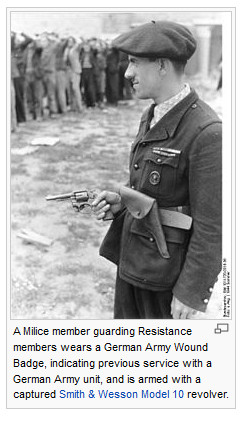 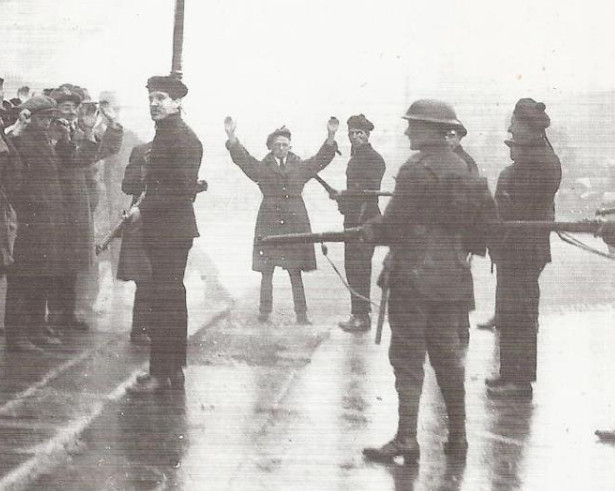
If it were not for men of low moral quality, collaborators like the RIC, then Ireland would never have been divided and colonized in the first place.
Not a historical fact of course, but a logical and credible probability.
Those in Ireland who want to present events current and historical to suit their own bias, often called revisionists, would have Irish people today connect with our own legitimate Police force, attempt direct comparison for empathy of the old RIC!
While The Garda are not perfect and like all organisations include the bad and lazy, the Garda are Irish and organic to Ireland and they have a democratic and credible mandate from the people.
Of course those who joined the RIC were not all naturally bad people, and many only in the RIC because of their desperate economic circumstances and need of a income of any kind.
The RIC were never the less, a foreign imposed colonial force, all in it were perversely facilitating the same foreign crown laws via terrorism or the the threat of against the will of the Irish people.
The RIC were facilitating foreign Colonial laws that had generally impoverished their own Irish people and often to extremes of poverty, laws that were designed to benefit only a select few to extremes of wealth, notably the foreign Crown and their franchise managers.
Brutal laws including the various British Crown colonial tithes, such as the Anglican tithes in Ireland collected on behalf of a foreign royalty that imposed its will and law at the end of a sword and gun, via terrorism.
The real history can be read in the ordinary letters of the people and the world commentary.
Newark Daily Advocate
Newark, Ohio
Jan 11, 1889
 A WONDERFUL IRISH SCENE A WONDERFUL IRISH SCENE
A curious and interesting scene was enacted over in Ireland yesterday. Loughrea was the place where the spectacle occurred. After the court had adjourned a sitting in which a number of Clanricarde rental cases had been under consideration, a hundred or more Nationalists headed by a band, paraded the streets, led by a convert from the enemy's side. The convert was one of her Majesty's policemen in full uniform. During lulls in the
music this enthusiastic proselyte would address the crowd, asserting that the police were heartily sick of the degrading work which they called upon to perform in Ireland. He said that there were many, who, like himself, would be only too glad to abandon the whole business.
Warmed Up the Boys.
After finishing one of these addresses, he called for three cheers for Dillon and O'Brien, but this juncture was an unlucky one in his new career, for at that moment the head constable, with a body of police, swooped down upon the crowd and capturing the rebellious constable, marched him off to the barracks under arrest.
Chester Times
Chester, Pennsylvania
Nov 22, 1886
 BATONS AND BAYONETS BATONS AND BAYONETS
Irish Tenants and Police Officers Come Together
LONDON, Nov. 23- For the first time since Gladstone's defeat an eviction affray has terminated in a violent attack by the police on the people. It occurred at Listowel,county Kerry. Some bailiffs seized a number of cattle in an action for rent and a fight ensued.
The police went to the assistance of the bailiffs, and with batons and bayonets succeeded eventually in dispersing the mob after wounding several of its members. This unfortunate affair, following so quickly on the heels of Sir Robert Hamilton's dismissal, will naturally be associated in the public mind with the inauguration of the new Tory regime.
Mr. Morley is going to speak next week on the Irish question. It is confidently expected that he will make a strong speech in favor of home rule and against concessions or compromises with the Unionists involving sacrifice of principles. He will review the attitude of the government and the speeches of Lord Salisbury and Lord Churchill in connection with the coercion, and announce the firm intention of the Liberal leaders to resist by all the means in their power any steps the ministry may propose in the direction of a coercive policy. He will on the same occasion expose the true state of affairs between the tenants and the landlords on the Clanricarde estates and denounce the conduct of the latter and hold him responsible for the difficulties that have arisen in that part of the country. This speech will give an immense impetus to the anti-eviction movement in Ireland and do much to enlighten English and Scotch opinion as to the true nature of the struggle now going on across the channel between the owners and occupiers of the land. In the meantime proofs thicken that the government has gone in head foremost for what is termed vigorous action. That the attack of the police on the people at the eviction affray above referred to is one of the first fruits of that resolution no observer of political movements here could for a moment doubt.
Trenton Times
Trenton, New Jersey
Dec 17, 1886
 MR DILLON ARRESTED. MR DILLON ARRESTED.
The Anti-Rent Agitators Taken in by the Police.
DUBLIN, Dec. 17- Mr. John Dillon and Mr. William O'Brien attended an immense National League demonstration at Loughrea yesterday which was presided over by Father Cunningham. A large number of clergymen, together with Commoners Harris and Sheehy, occupied seats on the platform, and a numerous contingent of tenants from the estates of Lord Clanricarde were present among the audience. Messrs. Dillon and O'Brien addressed the meeting eloquently and at great length, and at the conclusion of the speeches the two gentlemen opened rent offices for the collection of rents under the league's "plan of campaign". Hundreds of tenants came forward and paid the sums they were willing or able to pay, when suddenly a strong force of police, headed by Inspector Davies, burst into one of the offices, seized the money, books, and papers and arrested Mr. Dillon who was in charge. Mr. Dillon remonstrated with Inspector Davies and was assaulted and roughly handled by the police, unrestrained by the inspector. The police then proceeded upstairs to the office occupied by Mr. O'Brien, arrested that gentleman, and seized his books, papers, money, etc. Having secured the principals, the inspector sent a squad of police to arrest Messrs. Harris and Sheehy, and the four prisoners were arraigned before a magistrate and charged with conspiring to induce tenants to abstain from paying the rents they were lawfully bound to pay, which charge is included in the general one of conspiracy to defraud. The prisoners were remanded for one week.
When the police arrived Mr. Dillon had collected $100 and Mr. O'Brien about $350.
|
|
|
|
|
|
|
|
|
Irish Community Site MapIrish Message Site Map
Irish Forums Message Discussion :: RIC Police Ireland's Vichy law, Milice & other Collaborators � Sceala.com Irish Forums (Ireland) :: Designed In Ireland By Sceala The Irish
Message :: Irish Web Ireland :: RIC Police Ireland's Vichy law, Milice & other Collaborators From Sceala The Irish Message :: Irish
Forums
|

















 A WONDERFUL IRISH SCENE
A WONDERFUL IRISH SCENE

